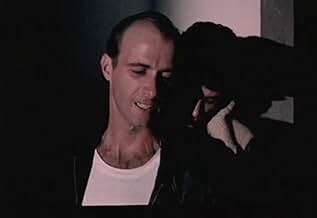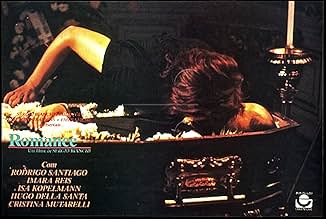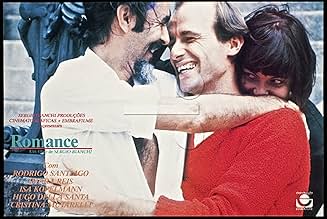Sérgio Bianchi's second feature film "Romance" revolves around the mysterious death of Antônio César (Rodrigo Santiago), an important intellctual
who was writing an incendiary book about a corrupt politician and the shady scheme he was involved. Three characters who knew Antônio try to solve the puzzle
of his complicated life and possibly find the work he was writing. The group of friends and lovers consists of a researcher (Imara Reis) who interviews
people who knew the man, trying to make a documentary about the late guy and also tries to find the book he was working on; a sad ex-lover (Isa Kopelman); and
his roomate/boyfriend (Hugo Della Santa, on his final film) that thinks he might be responsible for his death, believing he gave him AIDS, and now he
commits himself into not having any relationships with other men. Together yet apart (most of the time) they deconstruct the myth of a superior force and
uncover hidden truths and secrets which might led them into a life of angry desperation. All we know is that they loved him very much and now they try to
live their lives without his presence. Will they ever achieve?
"Romance" is a confusing yet intriguing film that serves to present the social and political situation of Brazil after the dictatorship, with its lack
of social inclusion, social economical clashes and the political machine that runs a nation. If the trio of characters are way too crazed and absurd,
appearing in awkward situations - the researcher is a victim of an unknown stalker who might be connected with the crooked politician (Sérgio Mamberti), a man
who even gives to the woman a position in a cultural center dedicated to Antônio - then we must fully concentrate on the deceased man, an emotionally charged
figure, imponent and very vocal of his political/social controversial positions. It turns out that all the flashbacks involving him makes of him the most
interesting character in the whole thing; it's because of him we keep on going watching it always interested in what he has to say or reveal about sexuality,
politics, the social evolution of Brazilians as concerned people who fight against injustices.
Here's a curious film about the forementioned topics, a little disjointed at parts and quite difficult to follow amidst the many random and unusual
conventions it brings to the table. It's a movie to watch in subsequent views, it might grow on the viewer on each view even though Mr. Bianchi didn't make
an easy experience for such intent. I'd probably have to watch two or three times to actually go deeper into its mystery and give a more detailed analysis.
I liked the performances, specially Santiago, and I could connect with the film's themes and messages despite the extreme and brutal ending. But had the movie
be about Antônio César's life rather than his death (sickness or murder, it's never explained but I think his buddy it's right on his conjecture) than we'd
have a more interesting film. He's the life of the story, has interesting and valid points and lots of spontaneous rants and meltdown's - such as when he
enters an office and throws down all the objects there from a window. He's a mad yet positive character, and I felt myself drawn into his mystique and ideals.
Like the three friends, we don't get to know the man fully well. We can only watch him from a distance realizing that his convictions are deep and hurtful
enough to get him killed. Very intriguing. 8/10.







